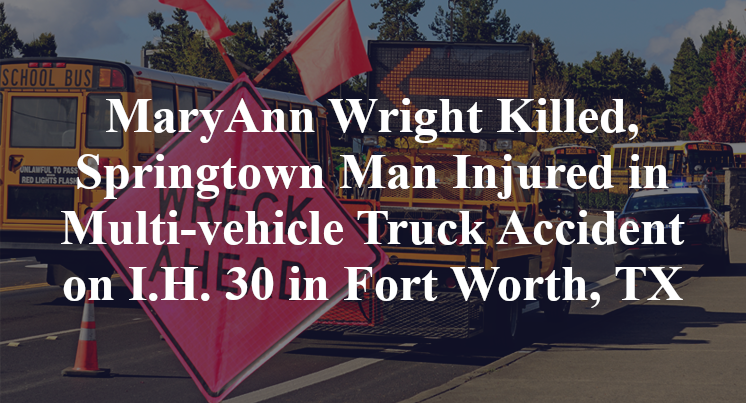MaryAnn Wright Killed, Springtown Man Injured in Multi-vehicle Truck Accident on I.H. 30 in Fort Worth, TX
Tarrant County, TX — March 12, 2025, Maryann Wright was killed and a Springtown man was injured in a multi-vehicle truck accident after 12:45 p.m. on I.H. 30.
According to authorities, an International 18-wheeler with a trailer in tow was traveling eastbound on Interstate Highway 30 in the vicinity east of Walch Ranch Parkway when the accident took place.

The cause of the accident remains unclear. Officials indicate that, for as yet unknown reasons, the truck failed to appropriately control its speed. It was subsequently involved in a collision with five other vehicles that were also traveling eastbound: a Dodge Ram 1500 pickup truck occupied by a 31-year-old man from Springtown, a Honda Civic, a Ford F-550, a second Honda Civic occupied by 85-year-old Maryann Wright, and a Lexus.
Wright and the Springtown man reportedly sustained severe injuries due to the wreck. They were each transported to local medical facilities by EMS in order to receive necessary treatment. However, Wright was ultimately unable to overcome the severity of her injuries, having later been declared deceased. Additional information pertaining to this incident is not available at this point in time. The investigation is currently ongoing.
Commentary by Attorney Michael Grossman
One thing I’ve learned over decades of litigating commercial vehicle crashes is that when a truck rear-ends multiple vehicles, the real challenge isn’t figuring out whether something went wrong—it’s figuring out what, why, and how many people or companies helped make it happen. A truck failing to control its speed is a big red flag. But it’s not a full answer—it’s the beginning of a list of questions that need answering before anyone can understand what really caused this crash.
Right at the top of that list is: What was the truck driver doing in the moments leading up to the crash? Was he distracted? Fatigued? Was there a medical emergency? Investigators can’t answer those questions unless they dig into cell phone records, in-cab camera footage (if available), and engine control module data—the truck’s “black box.” In my experience, if no one pulls that data, it often gets lost forever. And when that happens, so do a lot of answers.
The second layer of the investigation has to look at the trucking company itself. Because even if the driver made a critical mistake, I’ve found time and time again that poorly run companies can play just as big a role—if not a bigger one. Was this driver trained properly? Had he been on the road too long? Did the company enforce unrealistic schedules that made safe driving nearly impossible? And perhaps most importantly, should this driver have even been behind the wheel in the first place?
I worked a case not long ago where a trucking company hired a driver who had already been let go from several previous jobs. Instead of thoroughly vetting him, the company rushed him through a flimsy road test and put him on the highway. When a crash happened, their lawyers were quick to blame everything else—but the evidence told a different story. It’s not always about the person driving the truck at that exact moment; it’s about all the decisions that company made leading up to that moment.
Finally, I’d caution anyone from assuming that just because police are investigating, every relevant detail will be uncovered. Local authorities often do excellent work, but they also don’t always have the time, resources, or specialized tools to get to the bottom of a crash involving a commercial truck. If they’re not downloading the truck’s data, checking training logs, or securing company communication records, then they’re just documenting a crash scene—not conducting a full investigation.
From where I sit, the takeaway is simple: multi-vehicle crashes involving a commercial truck that failed to control its speed aren’t just about what happened on the road that day. They’re about every decision that led up to it—from the company office to the driver’s seat. That’s where the real story is found, and that’s what investigators need to dig into if the goal is to hold the right people accountable and ensure that those affected by the wreck receive the clarity and closure they deserve.

“These are essential reads for anyone dealing with the aftermath of a truck wreck”– Attorney Cory Carlson